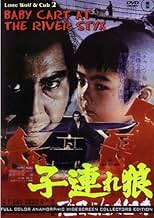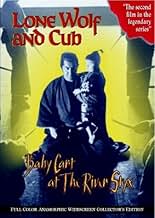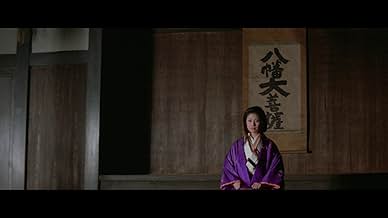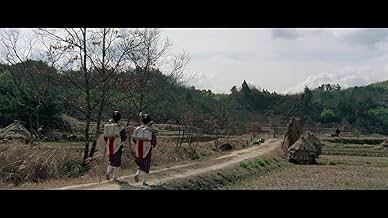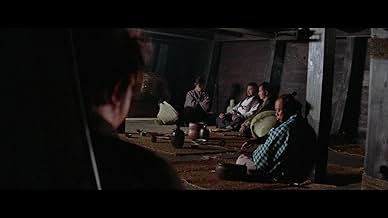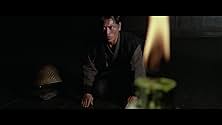Aggiungi una trama nella tua linguaTrailed by a clan of female ninja, Ogami is paid to assassinate a clan traitor accompanied by three killers known as the Gods of Death.Trailed by a clan of female ninja, Ogami is paid to assassinate a clan traitor accompanied by three killers known as the Gods of Death.Trailed by a clan of female ninja, Ogami is paid to assassinate a clan traitor accompanied by three killers known as the Gods of Death.
- Mitsugu
- (as Kanji Ebata)
Trama
Lo sapevi?
- QuizThe distinctive hats worn by the Gods of Death, are a traditional Japanese straw hat often associated with ronin. The style of hat is known as roningasa. 'Ronin' meaning masterless and wandering samurai, and 'gasa' meaning hat.
- BlooperWhen Ogami and Daigoro are walking through the forest shortly before being attacked by Kurokawa and his ninja henchmen (around the 31:30 mark), cars can be seen driving by in the background on the left side of the frame.
- Citazioni
Benma Hidari: [Ogami Itto has bested him and slashed him across the neck with a sword; blood is starting to flow from the wound, making a certain sound] My neck... my own neck... It sounds like it's wailing. My neck was sliced open diagonally. The cut wails like a cold winter wind. They call it "mogari-bue," - the whistle of a fallen tiger. I've always wished to kill someone, just once, and create such a fine cut and to sing this tune. Now I'm hearing it from my own neck. What a laugh.
[rolls over dead, with blood spurting out from his neck wound onto the sand]
- ConnessioniEdited into Shogun il giustiziere (1980)
First few minutes produce a stunning sequence of action mis-en-scene. Baby Cart at the River Styx(1972) is the best of the six film series because of complex character development, interesting story, and outstanding action sequences. The Chimes heard by Ogami Itto and his son, Daigoro during early moments of film are a reminder for them of their painful past. Humorous moment occurs when an owner of a hotel inn takes in Itto and son(Lone Wolf gave him gold pieces to watch over) after thinking of not taking them in moments earlier. There is a brilliant 360 to 180 degree pan of the camera that features an effective tight close up to display expressions of intuition from faces of Ogami Itto and Daigoro.
Places a little more focus into the code and demeanor of Ogami Itto than Part One. Ogami Itto as the Lone Wolf lives by Meifumado as a way towards restoring his family name while at the same time take revenge on the Yagyu clan. Ogami Itto kills without emotion yet a shed of humanity is somewhere within his soul. He is an action character of three dimensional depth that is rare for an action picture. Ogami Itto intriques me as a character of graphic novels and for this instance film because of his strong paternal presence.
Introduces some tough female ninja assassins that Lone Wolf & Cub have to go up against. They seem to be untouchable after dispatching a volunteer of the Kurokuwa group until the female warriors face off with Ogami Itto. Ogami Itto is one tough and determined opponent as the female ninja assassins find out when the majority of this group but one is killed off. The face off between Ogami Itto and Sayaka, the leader of the female assassin group successfully played by Kayo Matsuo has a surreal feel to it. Ogami Itto walking through a path of bodies with a baby cart that has a vegetable stuck in the middle front is a nice comic touch.
The confrontation between Lone Wolf & Cub and the Shogunate's Kurokuwa Ninja group is a combo of artful violent imagery and brilliantly smooth editing. This moment flows smoothly in a way that is hypnotic to the eye and mesmerizing to the brain. Although the scene does have it share of graphic violence, there is never a crude feel in the action as at moments in Sword of Vengeance(1972). Fantastic use of cuts and dissolves to make this moment one of the best action scenes from the first two films. The cinematography used in the action moves with graceful steps.
Lone Wolf and Cub:Baby Cart at the River Styx(1972) really gets at the heart of the story with its complex father/son relationship. The father/son relationship of Itto and Daigoro is what has made the Lone Wolf & Cub stories for so many people. Ogami Itto and Daigoro are tied together by an unbreakable bond that is indescrible in words. The bodily expressions tell more about the relationship of Ogami Itto and Daigoro than any sentence could ever do. An example of this notion happens when the leader of the Kurokuwa Ninja threatens to kill Daigoro is Itto does not give up.
The graphic violence is much higher here than in Sword of Vengenace(1972). The violent battle scenes of BCATRS stir around with stylistic expression. Maybe not as artisticly refined as in samurai films by Akira Kurosawa, but the violent battle scenes at least never feel bland or boring. I can see where filmmakers like John Woo got their influences when I watch the battle scenes of LW&C:BCATRS(1972). The graphic violence in part two and the other films in the series must have played an important influence on the bloody violence in Lucio Fulci's gothic chillers.
Ogami Itto and Daigoro follow a path of blood and corpses that is steeped in tragedy. In living by Meifumado, they are as one who hold a future that is bleak and hopeless. Only when they completely destroy the Yagyu Clan can the Lone Wolf and Cub return to a path of a hopeful future. For Daigoro, dying in the well would have been more merciful than living to an unknown future. Daigoro represents the good, kind side of Ogami Itto whom without would just be cold blooded and ruthless. The tragic path of the two is an element that is fascinating.
The most formidable opponets of Ogami Itto are the Bentenri brothers from part two. The duel between the brothers and the God of Death in the sandy desert is Leonesque. The head splitting moment is the creme de la creme of the duel. Tomisaburo Wakayama for this moment reaches the larger than life heights of Toshiro Mifune. Breathtaking samurai duel with excellent scenery that would have made Sergio Leone proud.
The actors who play the Masters of Death give their characters an unique quirk to make the Bentenrai brothers fascinating villains. One of the actresses(Michie Azuma) who plays a female ninja assassin would have a more substanical role as topless female assassin in Lone Wolf & Cub:Baby Cart in Peril(1972). Part One and Part two of LW&C use identical imagery. Better directed than the first film with fewer slow moments. Lone Wolf & Cub:Baby Cart at the River Styx(1972) stays true emotionally to the graphic novel that the film is based on.
I più visti
- How long is Lone Wolf and Cub: Baby Cart at the River Styx?Powered by Alexa
Dettagli
- Data di uscita
- Paese di origine
- Lingua
- Celebre anche come
- Lone Wolf and Cub: Baby Cart at the River Styx
- Aziende produttrici
- Vedi altri crediti dell’azienda su IMDbPro
Contribuisci a questa pagina


